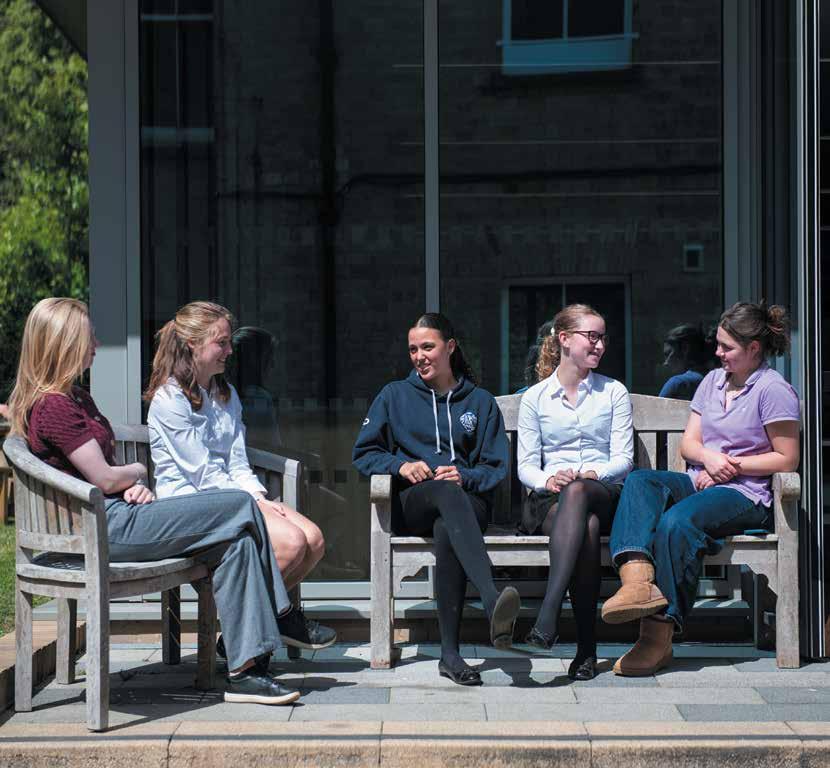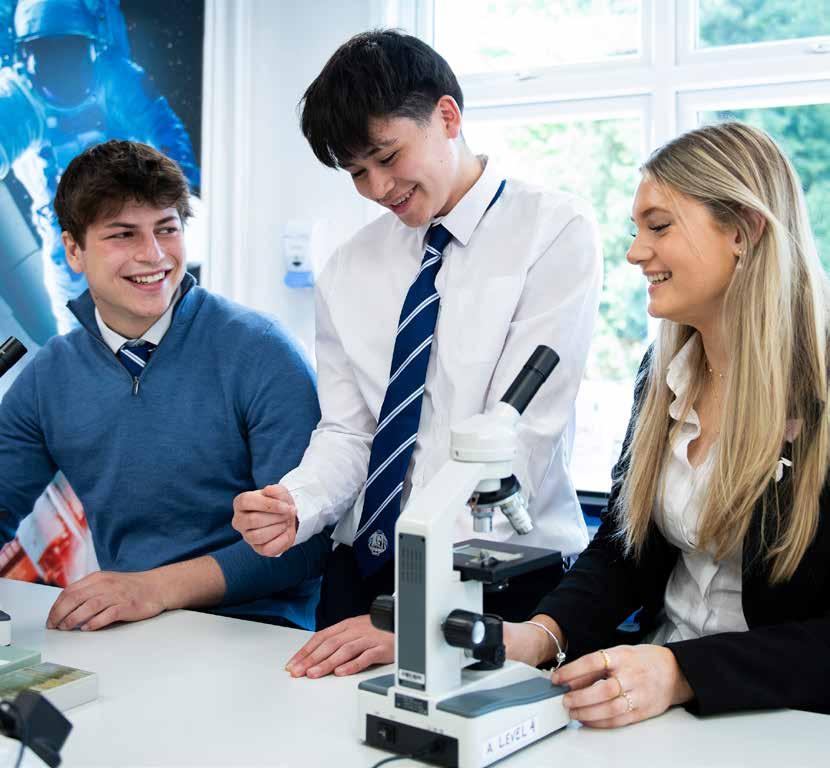




lE ad E rship opportuniti E s
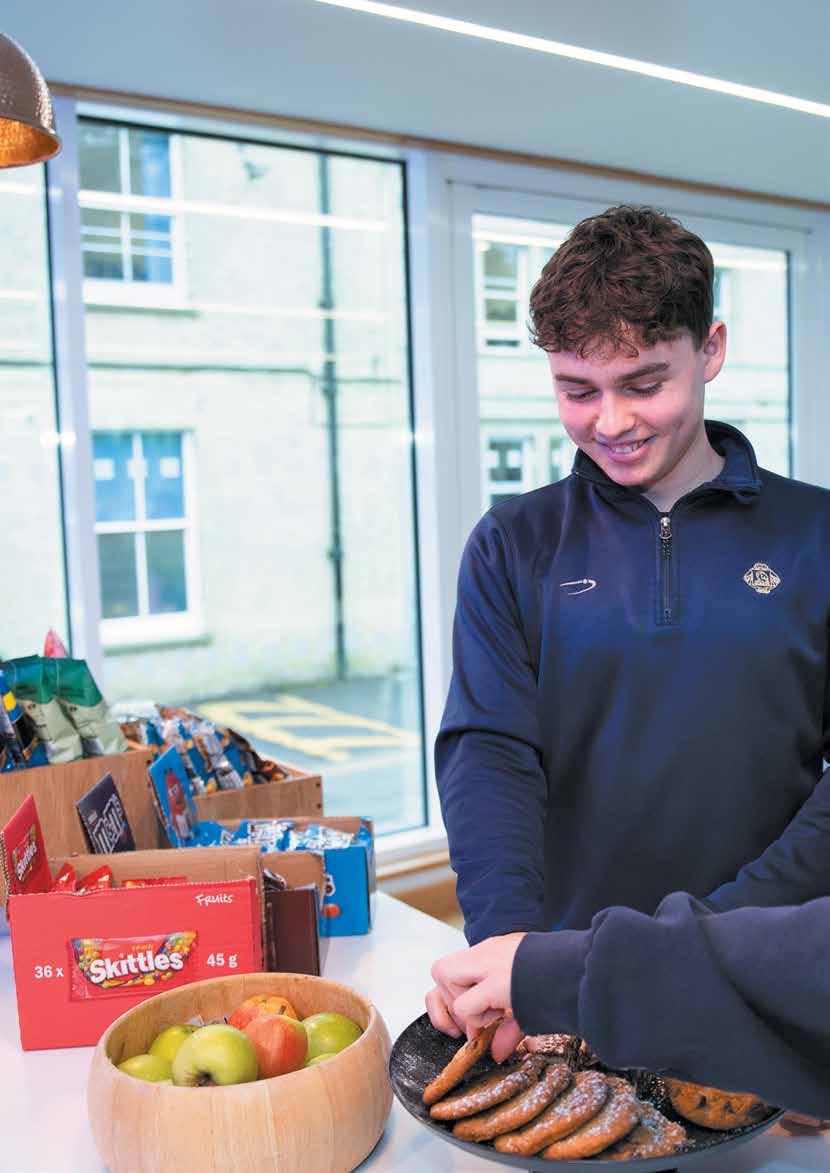
i ndividually tailor E d t E aching and support
Exciting E nrichm E nt programm E
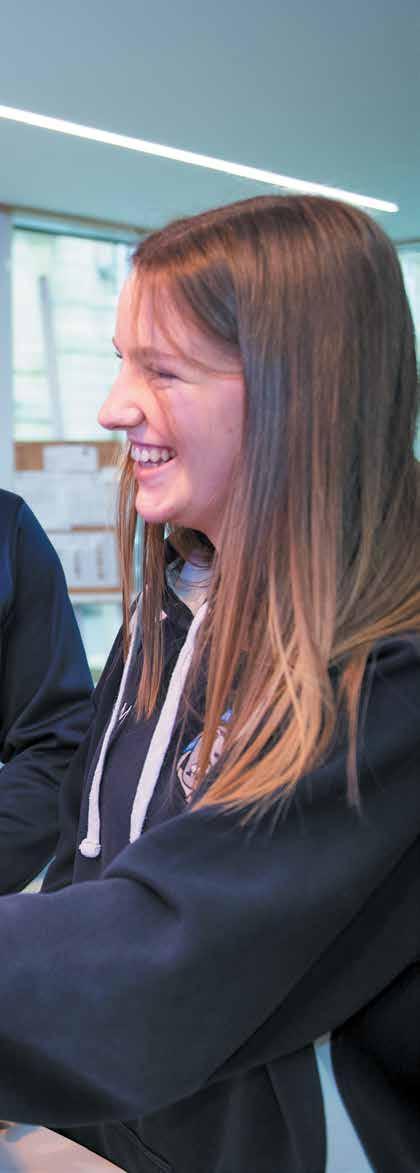
Your two years in the Sixth Form are exciting times. Studying at post-16 allows you to explore your chosen subjects in depth and to build a rounded, varied set of skills and knowledge to prepare you for higher education, future careers and adult life.
Sixth Formers at Dunottar receive individual, pastoral encouragement. They work, socialise and collaborate in a tailored setting within our very well-equipped Sixth Form Centre.
One aspect of life at Dunottar of which I am immensely proud is our commitment to every student as an individual and how we encourage you to become outstanding leaders and Warrior Learners. As well as A-levels and Alternative Academic Qualifications, there are opportunities to achieve further qualifications such as the Extended Project Qualification, the Level 3 Sports Leadership Qualification and the Duke of Edinburgh’s Gold Award. Some students have been known to do all of these as well as playing in our sports teams, our orchestras and performing on stage!
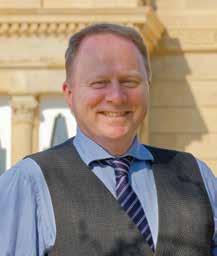
We believe that your time in the Sixth Form should be as useful, interesting and valuable as possible. This means we are as flexible as we can be in supporting student choices and we encourage a healthy balance between time for academic work and time for co-curricular activities. Our Sixth Form is about more than just academic learning. We want you to be involved in as many aspects of school life as possible, to be contributors, to become leaders and mentors and to give something back to the school and wider-community.
I hope that you find this booklet useful and that you are excited to hear about the opportunities in the Sixth Form at Dunottar.

Mr Mark Tottman Headmaster

Choosing your Sixth Form courses is an exciting opportunity to start shaping your future. Studying in the Sixth Form is very different from earlier years: you will focus on fewer subjects, explore topics in greater depth, take more ownership of your learning and develop the independence, confidence and critical thinking that are essential for life beyond school.
We are here to guide and support you throughout this process, helping you make well-informed choices that match your interests and strengths while setting you up for success—whether that is at university, on a degree apprenticeship or another post-18 pathway.
Most students at Dunottar select three a-level subjects or combine A-levels with an Alternative Academic Qualification (AAQ) such as BTEC Sport and Exercise Science, Level 3 AAQ Human Biology or the level 3 Diploma in Food and Nutrition. These vocational qualifications are fully recognised by universities and employers, offering a more practical, applied approach to learning that suits a wide range of learners and future aspirations.
In addition, you will take part in our Enrichment Programme, which includes options such as the Extended Project Qualification (EPQ) or the Sports Leadership Qualification—giving you the opportunity to develop broader skills, explore new interests and enhance your university or apprenticeship application.
If you already have a clear idea of your next steps, we will help you choose a subject combination that supports your ambitions. If you are still undecided, do not worry—many students are. This is the perfect time to explore your interests and think about what you most enjoy. Success often comes when you are engaged, motivated and curious, so follow your instincts and ask lots of questions.
This booklet provides detailed information about each course on offer in the Sixth Form, including content, assessment methods, future pathways and suggestions for complementary subjects. While some students are drawn towards the Sciences, Humanities or Arts, others will want to explore new areas such as Economics, Media Studies, Politics, Psychology or Sociology—subjects that may be new to you but which combine well with a wide range of courses.
In the coming months, you will have plenty of opportunities to talk to your teachers, your tutor, Mrs Boden and to me. You will also have a one-to-one discussion with a member of staff early in 2026 to explore your plans and refine your choices.
We are excited to support you as you begin this next stage of your journey.
In the meantime, I can be contacted in school or by email at n.jackson@dunottarschool.com
Mrs Nicky Jackson Director of Sixth Form
Studying in Sixth Form provides students with the opportunity to identify and develop their own interests by concentrating on and studying in depth the subjects they enjoy. Learning at this level involves greater contribution from the students and our small teaching groups allow full participation in lively and interesting discussions about the topics being studied.
We offer over 20 different subject options*, with most students electing to study three A-levels and one enrichment option or two A-levels and an Alternative Academic Qualification.
To achieve three A-levels we expect students to achieve a minimum of six grade 6s at GCSE, with those looking to study Maths or Science requiring grade 7s.
Students wishing to study alternative qualifications are expected to achieve at least a grade 4 in English Language and Maths, along with a minimum of grade 4 in any GCSEs required for progression to that course.
We offer the flexibility to combine your subject choices, creating a programme that includes both A-levels and alternative qualifications.
Please do contact us to discuss your subject choices, as we want each individual student to follow the educational pathway best suited to their needs and can tailor your programme accordingly.
*Courses are dependent on viable numbers opting for the subject.
• Art: Art, Craft & Design Three-Dimensional Design
• Biology
• Business
• Chemistry
• Computer Science
• Drama & Theatre
• Economics
• English Literature
• Food Science & Nutrition (Level 3 Diploma)
• French
• Geography
• History
• Human Biology (Level 3 AAQ)
• Mathematics
• Further Mathematics
• Media Studies
• Music
• Politics
• Religious Studies: Philosophy & Ethics
• Physical Education
• Physics
• Psychology
• Sociology
• Spanish
• Sport & Exercise Science (BTEC Level 3)
Selecting the right combination of subjects is not only about what you enjoy—it is also about where your choices can take you. Whether you are aiming for a competitive course at a Russell Group university, exploring vocational pathways, or considering a degree apprenticeship, your subject mix should reflect both your interests and your future ambitions.
The table below outlines suggested subject combinations tailored to a range of popular degree courses, highlighting which subjects are essential or preferred. This guidance is designed to help you make confident, informed choices that keep doors open and set you up for success beyond school. This is not an exhaustive list; there are many possible subject combinations. We encourage you to talk to the Sixth Form team about your ideas so we can help you shape the best pathway.
Accounting & Finance Maths (essential), Economics / Business
Architecture Maths, Physics, Art & Design subjects
Business & Marketing Business and/or Economics, Maths, Psychology, Sociology
Computer Science Maths, Computer Science, Further Maths
Engineering Maths, Physics, Further Maths
Hospitality/Sport Management BTEC Sport, Business, Food & Nutrition
law No required subjects
Medicine Chemistry (essential), Biology, Maths
Psychology Psychology (not always required, but useful), Biology / Human Biology, Maths
Veterinary Medicine Biology (essential), Chemistry (essential), Maths / Physics
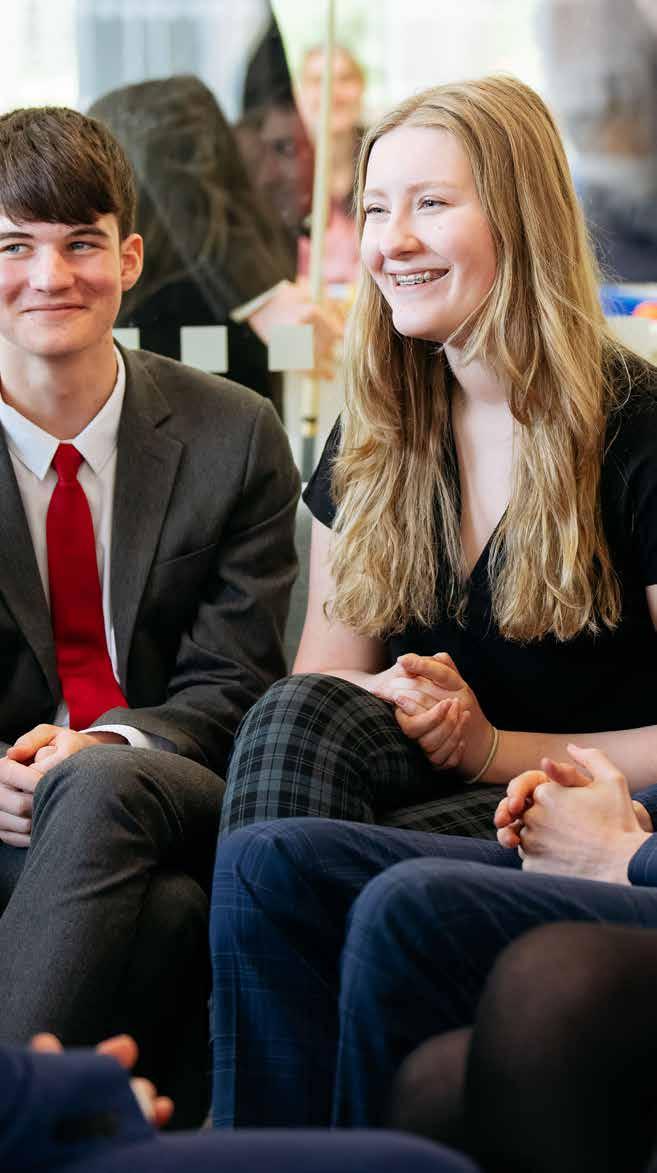
Maths, Economics, Business
Maths, Business, Psychology
Maths, Further Maths, Economics
Maths, Physics, Fine Art Maths, Geography, 3D Design
Fine Art, Physics, Computer Science
Business, Economics, Maths
Business, Psychology, Sociology
Business, Economics, BTEC Sport
Maths, Computer Science, Physics / Psychology
Maths, Physics, Chemistry / Computer Science
Economics, Geography, BTEC Sport
Business, PE, Sociology
Food Science & Nutrition, Business, Psychology
English Literature, History, Politics / Economics History, Philosophy & Ethics, Sociology
Chemistry, Biology, Psychology
Psychology, Sociology, Biology
Psychology, English Literature, Philosophy & Ethics
We have spent time talking to students and staff to create an enrichment programme which we believe will be both enjoyable to study and valuable in terms of the skills acquired. The enrichment qualifications are designed to be well-received by higher education institutions and future employers.
• Helps students learn how to project manage and take more responsibility for their learning
• Develops study skills
• Helps prepare for future study at university or for the workplace
• Adds value to their University application
• Allows the development of an interest beyond their studies
• Develops their critical thinking skills
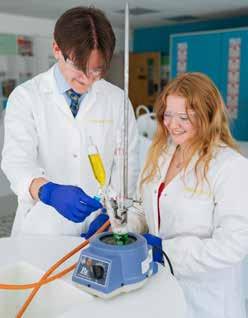
Students will take three A-level subjects or equivalent plus one enrichment options block. There are two option blocks to select from:
3 A-levels or equivalent + Extended Project Qualification 3 / July Year 12
Up to 28 UCAS points depending on grade
3 A-levels or equivalent + Sports Leadership (Level 3) 4 / October Year 13 16
In a small number of cases, a student may wish to study 2 A-levels, plus one Enrichment Block option. If that is your preference, please discuss this route with Mrs Hislop, Deputy Head (Academic).
Please note that the enrichment options offered are dependent on sufficient student numbers selecting each option.
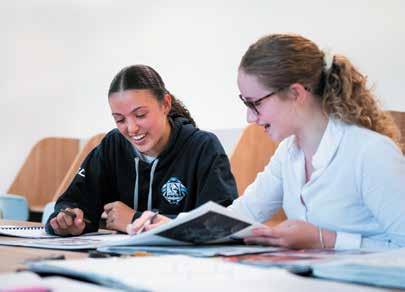
Our Scholars’ programme has been designed to provide Dunottar Scholars with an enriching experience that will bring out the best in our most able students.
Our Sixth Form Academic Scholars have access to a varied and inspiring programme which encourages their passions and intellectual development. Academic Scholars meet fortnightly at our Scholars’ Lunch - a forum where students engage with new and cutting-edge academic developments, exploring subject matter beyond that delivered as part of the curriculum.
To widen their experiences beyond school, we curate and suggest lectures, memberships and competitions where our Scholars can meet peers with similar interests, to deepen and hone their knowledge. We also encourage students to attend summer schools and seek work experience which we feel the scholars will benefit from.
Providing bespoke support, we are able to guide and prepare our scholars for their next steps. Working together, we identify courses and institutions which best suit their interests. We ensure that they write personal statements tailored to elite institutions and that, where appropriate, students are fully prepared for entrance examinations and interviews.
Music Scholars play a vital role in the life of the Performing Arts Department, contributing to school productions, a variety of concerts and workshops. Creating an enriching portfolio of opportunities for our Music Scholars is something that is very important to us and there are lots of events throughout the year that help support this, such as masterclasses, recitals, concert trips, showcase evenings and opportunities to take on leadership roles within our ensembles to allow students to develop their conducting skills.
Performing Arts Scholars play a leading role in school productions, performances and concerts and benefit from a rich tapestry of enrichment outside the classroom including co-curricular productions, workshops with industry professionals and theatre trips. Our Scholars receive regular support from the departmental team and are supported in their ambition to secure a career in the arts.
Sports Scholars will attend a series of inspirational seminars and workshops delivered by professional sports people along with sports nutritionists and psychologists, to develop and enhance their knowledge. Working with our personal trainers, our Sports Scholars will receive bespoke training programmes to identify key areas for improvements in their chosen sporting pathway. Our performance athletes will also visit St George’s Park to attend the Game Changer Performance Day.
Art Scholars are encouraged to develop their own creativity and personal style through an exciting and inspirational enrichment programme. The programme includes workshops with local practicing artists, guidance and support to complete the Bronze Arts Award, visits to artists’ studios and exhibitions, competitions, in-house workshops and TED talks.
I loved the close-knit community of the Sixth Form. My teachers knew me really well and I valued the relationships I built with the amazing Sixth Form staff team.
The dedicated facilities make you feel more responsible, independent and prepared for the outside world.
Staff at Dunottar provided such good support and advice on my post-18 options - the apprenticeship route is perfect for me and not one I would have considered on my own.
HENRY
The Sixth Form feels like a really safe and supportive space. You build close friendships here, and there’s always time for fun alongside the work.
AUSTIN
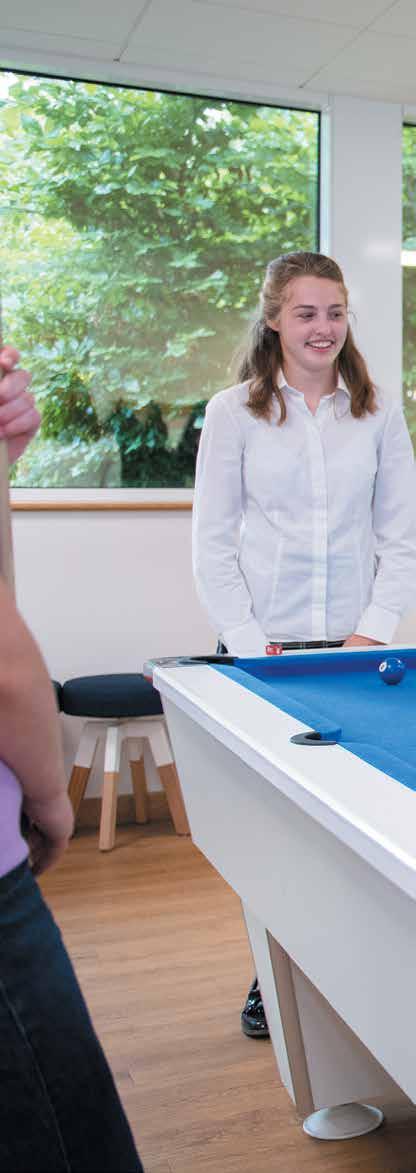
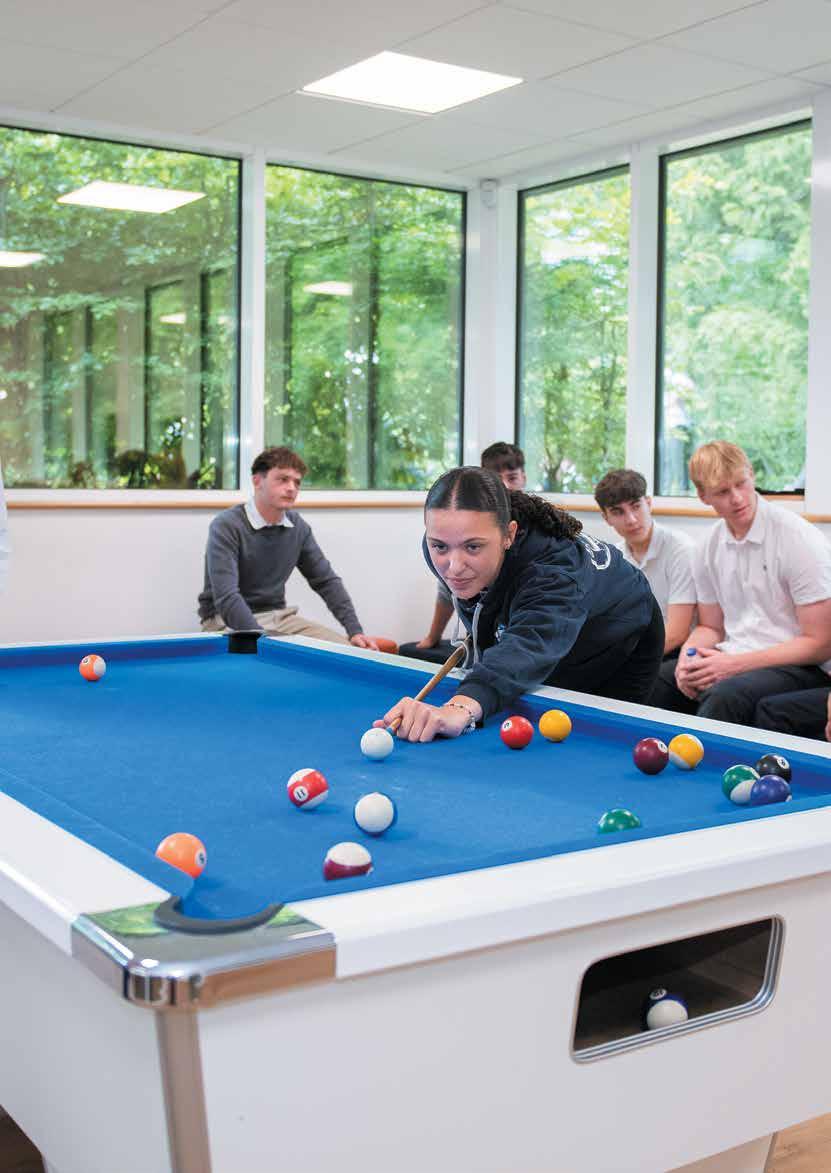
Many students enter the Sixth Form having followed the D-Infinity programme in the senior school, while others join the programme at the start of Year 12. The D-Infinity Programme in the Sixth Form aims to:
• Encourage students to be aspirational and aim high
• Inspire students to be intellectually and academically curious
• Support students in making competitive university applications, ensuring they are well prepared to sit entrance exams and have strong interview skills
• Develop students’ critical thinking
• Build confidence to articulate their arguments through debate and challenging discussions
• Enable students to have fun whilst being challenged academically
• Helping students explore a range of courses and universities to select those which best suit their individual aspirations and interests. Students fine-tune their choices and understand any requirements, above GCSE and A-level performance these courses may require
• Departmental and academic specialists prepare students for entry examinations, mock interviews and provide guidance on completing their UCAS application
• Developing students’ super-curricular interests by signposting wider opportunities and experience, which enrich learning and prepare students for future academic work
• Providing high achieving students with a community and forum for study and mutual support. Regular workshops introduce specific study skills, shown to be most relevant to high achievers, based on up-to-date educational research. As NACE (National Association for Able Children in Education) members, we draw on wider expertise to support students in becoming expert learners who can drive themselves and each other to perform at the highest levels
• Offering a personal, half-termly progress discussion to help students understand the actions they should take to achieve their goals

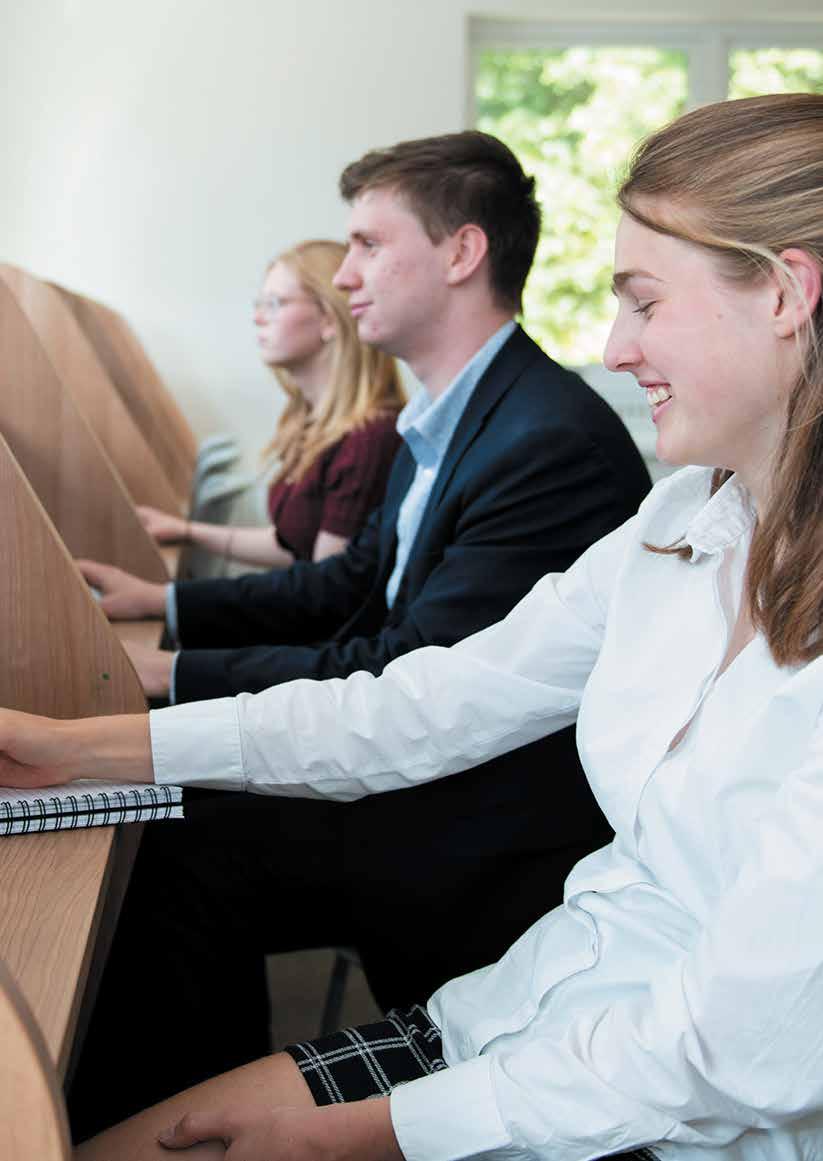
In addition to providing an excellent education, we want to provide our students with the necessary skills to succeed in life after Dunottar. Through a tailored programme of activities, we aim to inform our students in their choice of post-18 education, support them in the application process and instil them with the confidence they need to fulfil their future ambitions.
Our bespoke UCAS programme starts in the Spring term of Year 12. Students receive individual support and guidance from their subject teachers, tutors and the Director of Sixth Form to help them throughout the application process. During the summer term of Year 12, students take part in a range of activities designed to prepare them for making informed decisions about the next step in their educational journey including:
• Visiting a University and Apprenticeship Fair
• Attending presentations and workshops designed to help them choose the right course and university
• A three-day UCAS programme in June focusing on how to write their personal statement
• A work experience programme
• Hearing from external speakers to support the application process
• Regular one-to-one support meetings to help with the personal statement and making decisions about their next steps
All Sixth Form students are encouraged to gain additional work experience and to take their learning beyond the classroom to enhance their university application. We know that universities expect more than just academic knowledge, and this is an area we support and encourage our students to focus on and develop throughout their time in the Sixth Form.
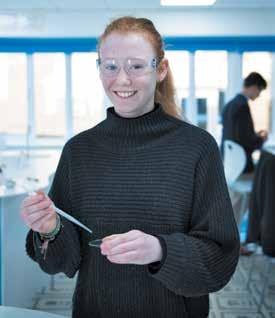
We provide bespoke advice and support for our high-achieving students wishing to apply to Oxbridge, Medicine, Veterinary Medicine and prestigious universities or competitive courses which require applicants to sit an entrance assessment.
For those students exploring alternative options, we provide advice and support on apprenticeships from our Head of Careers and through workshops run by external speakers. Students are also offered one-to-one support throughout the process from researching their options, preparing CVs and writing letters of application.
A series of careers evenings are held throughout the year where high-profile speakers from a wide range of backgrounds present to our students and answer any questions they may have. The interactive workshops cover a range of industries from Digital and STEM to Business, Sport and Creative Arts, providing students with real-life insights into the qualifications required to access jobs in these sectors and guidance on work experience opportunities from industry experts.
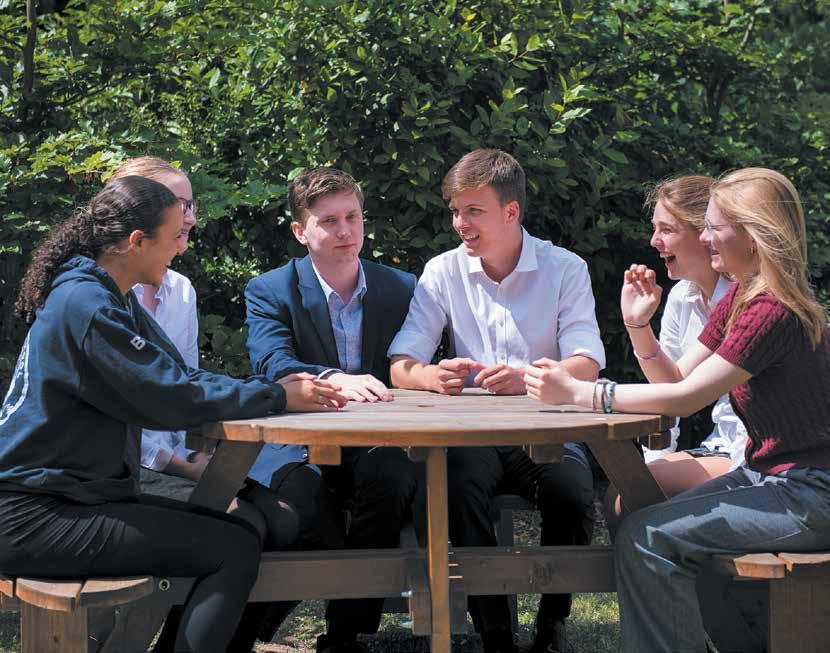


Students are encouraged to participate in Morrisby Profiling, a series of aspiration and aptitude tests, to help them investigate options at 18+. Students are invited to book a session with our careers advisor, to help students consider options available to them and discuss various pathways.
We also use Unifrog, an online platform which brings together a wealth of information to allow students to make the best choices about their future pathways. Both students and parents have access to Unifrog.
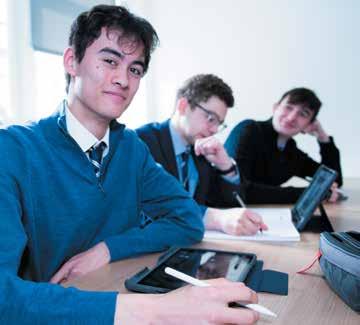
Alongside their subject choices, we recommend sampling at least one free Massive Online Open course (MOOC). These courses either provide a deeper understanding of the careers that students wish to pursue or showcase their interests as individuals. Whichever course they elect to study, they will stand out from the crowd.
Students have access to a state-of-the-art Sixth Form centre, which provides a modern, university-style working space with both silent study and collaborative work rooms, social spaces, the Pelican café and a recreation room with pool table and table tennis table.
Success in the Sixth Form depends on students’ habits, routines, attitudes and approaches to study. We run a programme focusing on study skills (VESPA - vision, effort, systems, practice and attitude) throughout Year 12, which is designed to encourage our students to become motivated and independent learners. The sessions allow students to reflect on their own mindset and provide them with the opportunity to identify their strengths and weaknesses, and to give them ideas on how they can develop as learners. These sessions also look at study habits, SMART targets, goal setting and how to manage deadlines.
All students in Years 12 and 13 participate in a weekly Learning for Life lesson delivered by their form tutor. The curriculum is drawn from the PSHE Association Programme of Study and is designed to give students the knowledge and skills required to keep themselves healthy and safe, thrive as informed and contributing members of society and live happy and fulfilled lives. Students are given the opportunity to look at and discuss a range of issues which are particularly relevant to them as young adults including mental and physical health and relationships. We also look at preparation for university life and the world of work.
Whether a student is new to Dunottar or coming into the Sixth Form from Year 11, the challenges and increased autonomy of life in the Sixth Form marks an exciting new start for everyone. Each student is allocated to a tutor who is their first point of contact throughout the year.
The tutor/student relationship is an important one in the Sixth Form; tutors get to know their students well and act as a trusted supporter and adviser. Tutor times provide the opportunity for a useful interchange of ideas and is often a time of lively discussion. The tutors work closely with the Senior Leadership Team on all aspects of pastoral care.

To support the mental, physical and emotional wellbeing of our students we offer a Team Games option and an Alternative Games option, ensuring that all students are physically active in either competitive or non-competitive sport.
Sixth Form students also have access to the school gym at allocated times throughout the week. Training sessions are also held once a week after school for Team Games options.
options include:
• Girls’ netball 1st VII and Social 2nd VII
• Boys’ football 1st XI, 2nd XI, 3rd XI and Social 4th XI
• Girls’ football 1st XI
• Boys’ rugby 1st XV and 2nd XV
• Boys’ cricket 1st XI and Social 2nd XI
• Girls’ cricket 1st XI
• Badminton
• Health and fitness
• Pilates
• Rock climbing
• Spin class
• Squash
• Swimming
• Tennis*
• Water sports*
• Volleyball*
• Wellbeing walks
* Summer term only
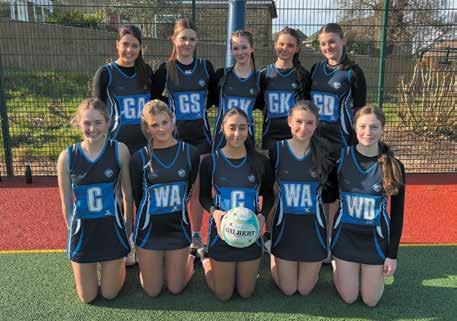
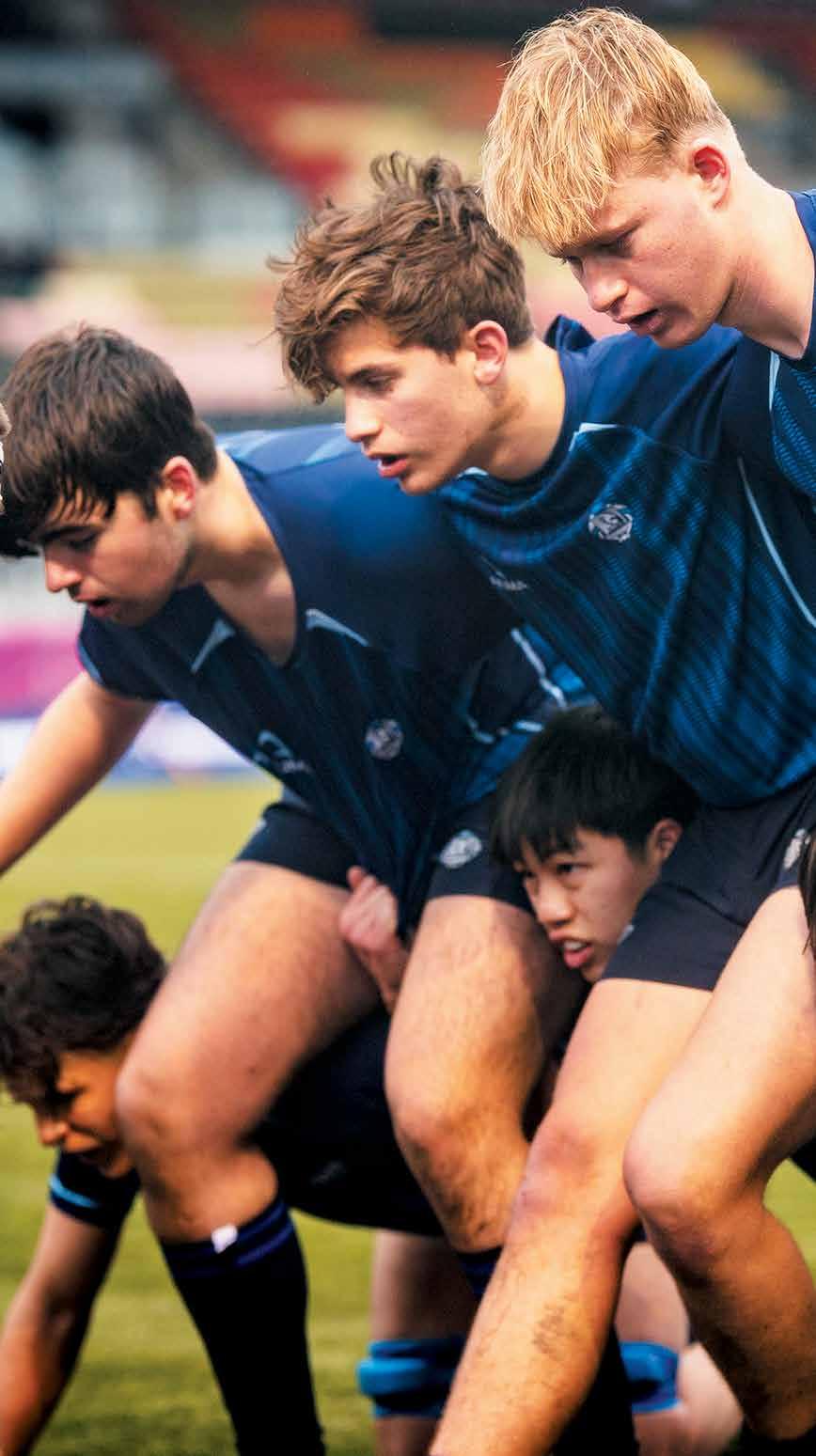
The co-curricular programme gives our students the opportunity to take part in a wide range of activities including music, sport and dramatic productions. Sixth Formers can also take part in the well-established Duke of Edinburgh’s Award.
The Gold Scheme is open to students over the age of 16 and comprises five sections – Volunteering, Physical, Skills, Expedition and Residential. Students can choose from a wide-ranging list of activities, embracing sports, music, hobbies and personal interests.
The residential element of the Award involves four nights away, undertaking a project with a new group of people. It’s great fun and a real chance to do something different! Examples of previous and potential projects include:
• A week-long cooking course
• Community projects in Zambia
• National Citizen Service
• Leading Summer Camp activities in the USA
• Elephant care in Thailand
• Volunteer to help orangutans in Peru
• Respite holidays for disabled people
• Ship racing in Norway
Achieving the Gold Award is a fantastic accomplishment as it shows you have the skills, determination and mentality to really succeed. Award presentations take place at Buckingham Palace in London with a member of the Royal Family in attendance.
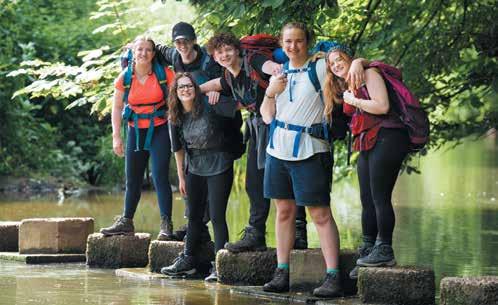

At Dunottar, our aim is to bring out the best in every student, enabling them to be the very best they can be. Being part of our Sixth Form gives students the opportunity to take on positions of responsibility which will enable them to help shape the future of the school, to be involved in many aspects of school life, and to leave a lasting legacy for future sixth form students to emulate and build upon. Students will develop their leadership skills alongside their studies and be encouraged to move out of their comfort zone in order to grow and flourish.
There are numerous opportunities for Sixth Form students to take on additional responsibilities and leadership roles. The process begins at the start of Year 12, with a leadership programme which prepares students for the opportunity to apply for a Prefect and Ambassador role. Our Prefects work closely with students in the lower years through Student Voice, assemblies and in tutor time.
As students move towards Year 13, there are further opportunities to expand and develop their leadership skills, with positions including the Heads of School Team, House Captains, Sports and Arts Captains (performing and creative). Through these opportunities, we see our students grow in selfconfidence and develop the skills they need for life beyond school.
Being in the Sixth Form has given me so many opportunities - becoming a Sports Leader and Head of School. I feel ready for whatever comes next. holly
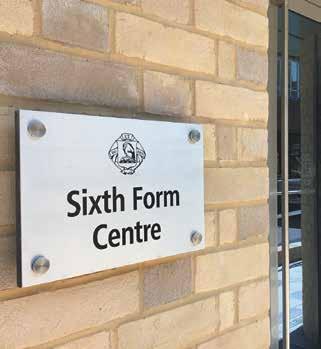
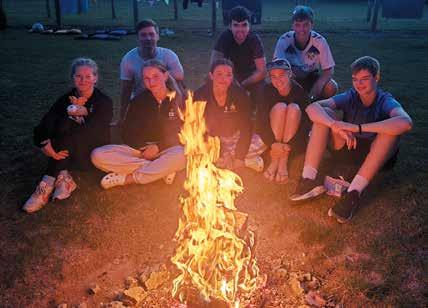
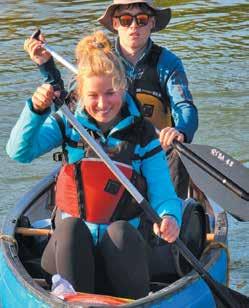
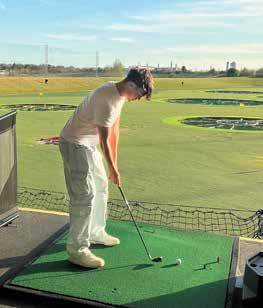
There’s a great social side to Sixth Form —whether it’s playing sport, getting involved in activities, or simply spending time with friends.
sarah
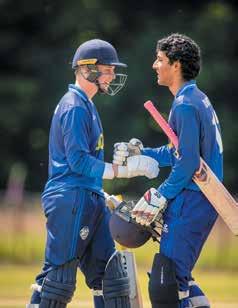

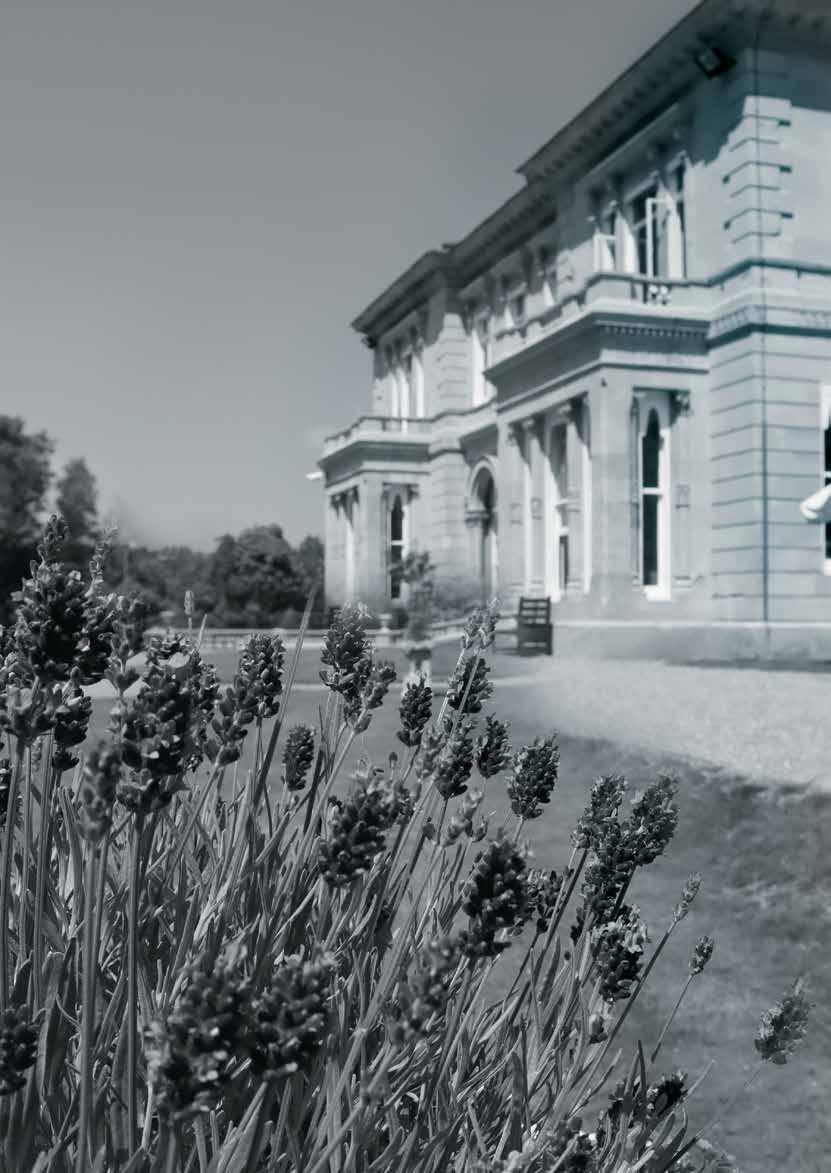
At Dunottar we offer 2 Art A-level subjects. Art, Craft & Design (AQA) and Three-dimensional Design (oCR).
If you are considering any sort of practical career in the creative industries, Art is vital. If you intend to do any Art based degree, be it Architecture, Fine Art, Graphics, Photography or Fashion among others, an Arts A-level is the main means by which you produce a portfolio of work; an entry requirement for all Art & Design based courses. They are practical subjects which will further develop your technical skills, they will expand your creativity and imagination; key elements of the courses are personal development and independent learning.
All of the arts subjects are a mechanism for the visual exploration of ideas, meanings and feelings at a personal level and in the wider context of the social, historical and cultural connections. The area of study is broad enough to enable you to explore and develop your understanding of formal elements in a variety of media. As an Art & Design student you will endeavour to work independently, having the freedom to develop and communicate meaning through exploration and experimentation. You will be expected to research and record ideas thoroughly to develop informed opinions and critical judgments about your own work and those of other artists. Students develop a high command of recording techniques through the expressive use of materials and processes. Structured sessions at the start of the course provide a solid foundation in observational drawing and use of processes. Coursework is based on a theme selected by the student, such as ‘collections’, with sustained visual research underlying your personal responses. The written component (1500 – 3000 words) explains their work and ideas as well as critical analysis of the artists and designers used to develop the visual responses to their theme.
Within the course, students will be visiting traditional and contemporary galleries and exhibitions to support their awareness of cultural, historical and the social context of artworks. These visits also inspire students with ideas of how to develop their own projects.
Career opportunities leading from the visual arts are numerous; the creative industries are amongst the largest growing and most successful industries within the United Kingdom. There are many exciting future applications for the knowledge and skills gained via any Art A-level; these include set design, animation, video game design, graphic design, web design, advertising, architecture, exhibit design, special effects for film, illustration, product design, furniture design, journalism, museum curator, stage and film makeup, textile and fashion design, photographer, art dealer, concept artist, art historian or logo designer to name but a few.
A RT, C RAFT & D ES i GN - HoW WiLL You BE ASSESSED?
This course is completed over two years and is assessed by NEA (Non-Exam Assessments) and an Externally set task (by AQA).
Component 1 - coursework/personal investigation (60% of A-level)
Initially students work on a series of technical and material-based short projects to enable them to develop their skills and understand the formal elements as a means of creating their own visual language through experimentation. Students then work on a ‘personal investigation’ and select a focused project using at least two of the related art disciplines of art; fine art, textiles, 3-dimensional design or photography. They are required to research in a critical, contextual study and they also explore their ideas in their individual practical studio work. Written notes are used to form the basis of the extended piece of writing (1500-3000 words).
The final project is based on a starting point from a paper provided by AQA. Time is allocated for preparation, experimentation and refinement of ideas culminating in a ‘timed test’ of 15hours.
The Three-Dimensional Design course covers the parameters of the Art A-Level while placing emphasis on the process of designing and creating 3D models and products. The course offers a balance between critical analysis—gaining inspiration from artists, designers, and craftspeople—and the practical element of creating responses and modelling with varied materials.
Students learn the design process from initial concept to final prototyping, including sketching, model-making, and using CAD software. They explore different materials and their properties, with an emphasis on using workshop machinery.
Communication skills are developed by translating design ideas through technical drawings, maquettes, and presentations. This helps students build a portfolio of design work that showcases a range of skills and ideas.
THREE-DiMENSioNAL DESiGN - HoW WiLL You BE ASSESSED?
This is completed over two years and is assessed by NEA (Non-Exam Assessments) and an Externally set task.
Learners should be able to explore, research and acquire techniques and develop their skills, knowledge and understanding in a range of approaches specific to Three-Dimensional Design.
Students will demonstrate how they can problem solve by designing or creating products which have a decorative or functional role. They may include in their work one-off experimental pieces, traditional crafts or industrial designs for mass consumption ideas and initial prototype models. Students will work in one or more of the design disciplines, which could include jewellery, design for television, games or film, stage or set, environmental, construction or architectural design, body ornament and product design. Students will have a variety of techniques available including laser cutting and mixed-media applications.
They are required to research in a critical, contextual study and they also explore their ideas in their individual practical studio work. Written notes are used to form the basis of the extended piece of writing (minimum of 1,000 words).
Within the course, students will be visiting traditional and contemporary galleries and exhibitions to support their awareness of cultural, historical and the social context of artworks. Also to be inspired with ideas of how to develop their own projects.
Component 2 - externally set task (40% of A-level)
The final project is based on a starting point from a paper provided by OCR. Time is allocated for preparation, experimentation and refinement of ideas culminating in a ‘timed test’ of 15hours.
thrEE-dimEnsional dEsign highlights of thE coursE
• Learn to use equipment such the laser cutter and workshop machinery.
• Develop ability to experiment with and explore materials such as acrylic, wood, metals, clay and plaster.
• Develop techniques such as construction and architectural modelling.
• Develop understanding of artists and designers and their purpose.
WHY STuDY BioLoGY?
Saving threatened species, studying microbes, curing diseases? Today’s world offers many challenges to a biologist. Which ones are you interested in? With exciting advances in areas such as genetics, molecular biology, biochemistry, the environment and marine science – there is no greater time to be studying Biology.
The department is well resourced and we try to make the subject as hands-on as possible – organising trips to spend the day at Wakehurst to learn more about gel electrophoresis and the Millennium Seed Bank and a trip to Biology Live to hear current research from famous British biologists.
We also make use of our beautiful grounds to study ecology and biodiversity through sampling.
coursE outlinE
• Biological molecules
• Cells
• Organisms exchanges substances with their environment
• Genetic information, variation and relationships between organisms
carEErs and opportunitiEs
• Energy transfers in and between organisms
• Organisms respond to changes in their internal and external environments
• Genetics, populations, evolution and ecosystems
• The control of gene expression
Whether deciding on a career in medicine, genetics, forensics, pharmacy, veterinary medicine, biochemistry, psychology, sports science, conservation or journalism, a biological qualification gives you many skills and increases your career options so you can adapt to the world changing around you.
furthEr rEading
The Body by Bill Bryson, The Gene, an Intimate History by Siddhartha Mukherjee, The Immortal Life of Henrietta Lacks by Rebecca Skloot, Hello World by Hannah Fry and Why Elephants Have Big Ears by Chris Lavers.
HoW WiLL You BE ASSESSED?
3 x written examinations ( 2 x 2 hours 15 mins and 1 x 1 hour 30 mins).
paper 1
Written exam: 2 hours, 91 marks, 35% of A-level
Sections 1 - 4
76 marks short and long answer questions
15 marks extended response questions
paper 2
Written exam: 2 hours, 91 marks, 35% of A-level
Sections 5- 8
76 marks short and long answer questions 15 marks comprehension question
Paper 3
Written exam: 2 hours, 78 marks, 30% of A-level
Sections 1-8
38 marks short and structured questions, including practical techniques and calculations
15 marks critical analysis of given experimental data
25 marks: one essay from a choice of two titles
This A-level Business course introduces you to all you need to know about working in business, providing a solid foundation for further study.
With a focus on helping you to become a good decision maker, you’ll learn essential managerial skills, alongside techniques to help you become an analytical problem solver. These skills are all highly sought after and valued in a wide range of careers.
If you would like to study business, finance or management at university, A-level Business provides an excellent foundation. The skills you learn are also transferable across a broad range of subjects and careers.
Whatever you choose to do in the future, you will find that the things you learn in this course will help. For example, you will probably work with lots of different people, so knowledge of motivational theory will help you to work well with others and help them achieve their potential. You might have ambitious plans to start your own business. If that’s the case, you will find the marketing and finance topics particularly useful.
A-level assessment consists of three two hour written exams taken at the end of the two year course.
Each exam will be worth a third of the A-level. All three papers will draw on material from the whole course, and will feature a range of question styles including multiple choice questions, short answer questions, essay questions, data response questions and case studies.
A-level Chemistry attempts to answer the big question “what is the world made of?” and it is the search for this answer that makes this subject so fascinating. From investigating how one substance can be changed drastically into another, to researching a new wonder drug to save millions of lives, the opportunities that chemistry provides are endless.
At the heart of Chemistry, like all sciences, are practical activities. Throughout the course you will carry out practical activities including: measuring energy changes in chemical reactions, tests for identifying different types of compound, different methods for measuring rates of reaction, studying electrochemical cells, preparation of organic solids and liquids and many more.
coursE outlinE
Including atomic structure, amount of substance, bonding, energetics, kinetics, chemical equilibria and Le Chatelier’s principle.
Including periodicity, Group 2 the alkaline earth metals, Group 7(17) the halogens.
Chemistry
Including introduction to organic chemistry, alkanes, halogenoalkanes, alkenes, alcohols, organic analysis.
carEErs and opportunitiEs
Including thermodynamics, rate equations, the equilibrium constant Kp, electrode potentials and electrochemical cells.
properties of Period 3 elements and their oxides, transition metals, reactions of ions in aqueous solution.
Including optical isomerism, aldehydes and ketones, carboxylic acids and derivatives, aromatic chemistry, amines, polymers, amino acids, proteins and DNA, organic synthesis, NMR spectroscopy, chromatography.
Possible degree options taken by students who have an A-level in Chemistry are: • Chemistry • Biology
• Pre-clinical medicine • Mathematics • Pharmacology.
Studying an A-level Chemistry related degree at university gives you all sorts of exciting career options, including:
• Analytical chemist • Chemical engineer • Clinical biochemist • Pharmacologist • Doctor • Research scientist (physical sciences) • Toxicologist • Chartered certified accountant • Environmental consultant • Higher education lecturer • Patent attorney • Science writer • Secondary school teacher.
furthEr rEading
Chemistry, A Very Short Introduction; The Elements, A Very Short Introduction; Molecules, A Very Short Introduction.
HoW WiLL You BE ASSESSED?
Written exam: 2 hours, 105 marks, 35% of A-level
exam: 2 hours, 105 marks, 35% of A-level
exam: 2 hours, 90 marks, 30% of A-level
Computer Science gives students the chance to develop computational thinking skills, design systems and understand the power and limits of human and machine intelligence. It is an intensely creative subject which can provide students with a real satisfaction when something they have built from a blank page works; it also helps to develop patience, resilience and problem solving skills when a program refuses to run as expected!
Computing skills are the foundation of numerous professional careers in many dynamic sectors, such as technology, business, finance, health and the games industry. The A-level course is an excellent preparation for students who want to go on to study Computer Science at a higher level and will also provide a good grounding for other subject areas that require computational thinking and analytical skills.
The course consists of the following components:
• Computer Systems
• Algorithms & Programming
• Programming Project
The Algorithms and Programming component includes problem solving and programming as well as the use of algorithms to describe problems. The main programming language used is Python; students enjoy the independence of creating their own programming project in Year 13.
ToPiCS oN THE CoMPuTER SYSTEMS PAPER CoVER A WiDE RANGE oF AREAS:
• How does the processor inside a computer work and what affects the performance of a processor?
• What different input and output devices can be used to solve problems?
• How do Operating Systems work?
• How can we program using different web technologies such as HTML, CSS and Javascript?
• How is data represented in a computer? e.g. binary, hexadecimal.
• How can I solve problems with boolean logic?
• What are the ethical, moral and cultural issues surrounding technology? e.g. use of Artificial Intelligence, monitoring people’s behaviour and the environmental impacts of technology.
HoW WiLL You BE ASSESSED?
“i regard the theatre as the greatest of all art forms, the most immediate way in which a human can share with another, the sense of what it is to be a human being. “ – Oscar Wilde
Throughout the two years, you will gain a deep knowledge and understanding of key theatrical movements in history, explore a range of theatre practitioners, styles and genres, as well as developing your skills as a theatre practitioner in your own right. During the course, you will have to consider your approach to play texts as an actor, director and designer; making informed and creative decisions based on your historical, political, cultural and artistic understanding of the plays studied. You will be a reflector; always finding opportunities to critique and refine your work. You will consider the purpose of theatre as a whole, and reflect on the world that theatre presents back to us.
Theatre Workshop Non-exam assessment: internally assessed, externally moderated 20%
Learners will be assessed on either acting or design. Learners participate in the creation, development and performance of a piece of theatre based on a reinterpretation of an extract from a text chosen from a list supplied by WJEC.
The piece must be developed using the techniques and working methods of either an influential theatre practitioner or a recognised theatre company.
Learners must produce:
• A realisation of the performance or design
• A creative log.
Text in Action Non-exam assessment: externally assessed by a visiting examiner 40%
Learners will be assessed on either acting or design. Learners participate in the creation, development and performance of two pieces of theatre based on a stimulus supplied by WJEC:
1. A devised piece using the techniques and working methods of either an influential theatre practitioner or a recognised theatre company (a different practitioner or company to that chosen for Component 1)
2. An extract from a text in a different style chosen by the learner. Learners must realise their performance live for the visiting examiner. Learners choosing design must also give a 5- 10 minute presentation of their design to the examiner. Learners produce a process and evaluation report within one week of completion of the practical work.
Text in Performance: Written examination: 2 hours 30 minutes 40%
Sections A and B open book: Clean copies (no annotation) of the two complete texts chosen must be taken into the examination. Two questions, based on two different texts, one written pre-1956 and one written post-1956.
Section A
• The Winter’s Tale - William Shakespeare
• Rutherford and Son - Githa Sowerby
• A Raisin in the Sun - Lorraine Hansberry
• Father Comes Home From the Wars
- Suzan-Lori Parks
• Home, I’m Darling - Laura Wade
• Company - Stephen Sondheim (2018 revival)
Section B
• The Bacchae - Euripides
• Blood Wedding - Federico Garcia Lorca
• The Arsonists (The Fire Raisers)
- Max Frisch
• Death and the Kings’ Horseman
- Wole Soyinka
• Brief Encounter - Noel Coward adapted Emma Rice
• Small Island - Andrea Levy adapted Helen Edmundson
Section C
The Book of Dust: La Belle Sauvage
- Philip Pullman adapted by Bryony Lavery
Career opportunities include lawyer, television presenter, director, writer, dramaturge, actor, entrepreneur, business owner, designer, critic and many more.
A-level Economics will give you an excellent understanding of how economies allocate their scarce resources to meet the needs and wants of their citizens. You will develop a greater understanding of the economic problems which face individuals, firms and governments on a local, national and global level and the alternative ways these problems can be resolved.
You will investigate microeconomic topics such as how individual decisions impact economic outcomes, the importance of competition, how markets operate and why they fail and how the distribution of income and wealth is affected. At the same time you will learn about macroeconomics, looking at the ‘big picture’ of how our national economy fits into the global context, the global impact of financial markets and monetary policy and the operation of the international economy.
An A-level in Economics will benefit you if you are looking to go on to study economics, business or finance at university. The skills you acquire will help you no matter what degree course you choose.
You may choose to pursue a career in a directly related field such as banking or finance. The A-level course in Economics will stand you in good stead by giving you an insight and understanding of the economic forces that impact your day to day activities.
Alternatively, you may decide to follow a career path which isn’t directly related to your course of study. The analytical and evaluation skills that you will have developed will be useful whatever path you choose in the future.
Over this two year course, you will study areas and topics drawn from both micro and macroeconomics.
Microeconomics:
• the economic problem and economic methodology
• individual economic decision making
• price determination in a competitive market
• production, costs and revenue
• perfect competition, imperfectly competitive markets and monopoly
• the labour market
• the distribution of income and wealth: poverty and inequality
• the market mechanism, market failure and government intervention in markets.
HoW WiLL You BE ASSESSED?
Macroeconomics:
• the measurement of macroeconomic performance
• how the macroeconomy works
• economic performance
• financial markets and monetary policy
• fiscal policy and supply-side policies
• the international economy.
At the end of the two year course, you will sit three two hour written exams – each exam will be worth one third of the A-level. Paper one will cover markets and market failure, paper two will cover the national and international economy and paper three will draw on material from the whole course.
The papers will feature a range of question styles including:
• multiple choice questions
• essay questions
• case studies
• short answer questions
• data response questions
Research shows that companies value the strong communication skills that an A-level in English literature teaches. You will develop your collaborative skills, critical thinking skills and creative thinking skills. You will also develop the skills of working independently, demonstrating tenacity and resilience. You will research, synthesise, contextualise and adapt your ideas. Employers love these skills!
An A-level in English literature combines well with a wide range of A-level subjects, including more technical STEM subjects. It helps students to keep their options—and their minds—open.
Choosing English Literature is useful for a wide range of careers. Former Dunottar students have taken their A-level to become a BBC news presenter and reporter, a strategy consultant, an IT consultant, an entrepreneur and a solicitor…and there are many other examples of careers!
English is about you: your ability to think about the world around you, to form critical opinions and to express yourself. As an English student, you’ll study the past and apply it to the present and the future.
At Dunottar, you’ll be studying for the OCR A-level in English literature:
• Drama and poetry pre-1900: exam assessed, worth 40% of A-level
• Comparative and textual study: exam assessed, worth 40% of A-level
• Non-examined coursework, worth 20% of A-level
The texts might vary from year to year because we want to keep the teaching as fresh and lively as possible! You will have two English teachers, who will share their individual expertise with you. So far, the drama and poetry pre1900 texts have been The Tempest, The Doll’s House and poetry by Christina Rossetti. In recent years, the comparative and textual study unit has focused on Gothic texts (The Bloody Chamber and Other Stories paired with Dracula or Frankenstein or The Wasp Factory) or dystopian literature (The Handmaid’s Tale and Nineteen Eighty- Four). The coursework texts have also been varied. For example, with the comparative task, students have compared A Streetcar Named Desire to Property or The Kite Runner. For the second coursework task, students have the option to write an analysis of a poem from Carol Ann Duffy’s The World’s Wife, or write an original poem in the style of Duffy.
indEpEndEnt rEading
An A-level in English literature is easy to fit into your lifestyle as an independent reader! What could be more enjoyable than reading novels for pleasure, knowing that this is part of your A-level? To take your understanding of the texts to the next level, the school also has a subscription to the English and Media Centre (EMC) magazine. The British Library’s website is also a fascinating source of relevant articles!
An understanding of food science and nutrition is relevant to many industries and job roles. Care providers and nutritionists in hospitals use this knowledge, as do sports coaches and fitness instructors. Hotels and restaurants, food manufacturers and government agencies also use this understanding to develop menus, food products and policies that support healthy eating initiatives. Many employment opportunities within the field of food science and nutrition are available to learners who have studied Food Science & Nutrition.
Together with other relevant qualifications at Level 3, such as A-levels in Biology, Chemistry, Sociology and Maths, learners will gain the required knowledge to be able to use the qualification to support entry to higher education courses as outlined below:
• BSc Food and Nutrition
• BSc Human Nutrition
• BSc (Hons) Public Health Nutrition
• BSc (Hons) Food Science and Technology
coursE outlinE
unit 1: Meeting Nutritional Needs of Specific Groups (mandatory)
This unit will enable you to demonstrate an understanding of the science of food safety, nutrition and nutritional needs in a wide range of contexts, and through on–going practical sessions, to gain practical skills to produce quality food items to meet the needs of individuals.
HoW WiLL You BE ASSESSED?
unit 2: Ensuring Food is Safe to Eat (mandatory)
This unit will allow you to develop your understanding of the science of food safety and hygiene; essential knowledge for anyone involved in food production in the home or wishing to work in the food industry. Again, practical sessions will support the gaining of theoretical knowledge and ensure learning is a tactile experience.
1 and unit 2 are assessed through external assessments (examinations).
unit 3: Experimenting to Solve Food Production Problems or unit 4: Current issues in Food Science & Nutrition
Studying one of the two optional units - Unit 3 Experimenting to Solve Food Production Problems or Unit 4 Current Issues in Food Science & Nutrition will allow you the opportunity to study subjects of particular interest or relevance to you, building on previous learning and experiences.
1 is usually sat at the end of year 12 and Unit 2 is sat between 1st May – 1st June in Year 13.
or
“There has never been a better or more important time to study geography. With growing interest in issues such as climate change, migration, environmental degradation and social cohesion, geography is one of the most relevant courses you could choose to study. Geographers are also highly employable.” Dr Rita Gardner, Director of the RGS-IBG
A-level Geography gives students the scope to become independent thinkers. It offers an opportunity to develop and formulate responses and to research and investigate different attitudes, responses or sides to a topic or theme. It engages and involves the learner by using topical and current case studies to allow coverage of issues on a variety of different scales. This ideally places the A-level geographers with well-developed research skills which will be invaluable in the setting of continuing or further education. Furthermore, Geography is viewed by the Russell University group as a ‘facilitating subject’ which means it is a subject required more often than others for admission to a variety of non-related university courses.
Physical Geography Paper
(2 hours 30 mins)
40% of the A-level
Human Geography Paper
(2 hours 30 mins)
40% of the A-level
independent investigation
3,000-4,000 words 20% of the A-level
Water and the Carbon Cycle, Glacial Systems and Landscapes and Hazards
Global Systems and Global Governance, Changing Places and Contemporary Urban Environments
4 days fieldwork, some of which will lead to an Independent Investigation
The study of these, through engaging students with contemporary themes, at a variety of scales, which resonate with their direct or media experience, brings the subject to life and allows an opportunity and expectation of higher levels of cognitive and empathetic engagement.
This will offer students enormous opportunities including the ability to learn how to research, analyse and synthesise information and data. It allows them to question the validity of this information to understand opposing viewpoints, arguments or theory with reference to examples in the real world, providing the ability to make well informed decisions and engage problem solving skills both independently and through teamwork.
carEErs and opportunitiEs
Geography teaches important life skills, personal learning and thinking skills and functional skills, as well as developing a critical way of thinking about the world. Employers are looking for quality people to invest in, and geography is a subject which explores the importance of the future. Careers include those working directly in the subject such as Meteorologist, Climate Scientist, Surveyor, Hydrographic Surveyor, International Development, Flood Research, Air Pollution Specialist, Catastrophe Risk Analyst, Coastal Technical Specialist, Data Collector, GIS Analyst and many more. There are also careers which require skills a Geographer will bring such as Law, Media, Education, Accountancy, Engineering, etc.
History is a popular subject at A-level and the skills learned at GCSE will provide a solid foundation for further study in this subject. History will appeal to those students who wish to improve their analytical skills, enjoy investigation and discovery, enjoy debate and like putting forward a well-argued case.
The History Department at Dunottar has a good tradition of achieving excellent examination results and students benefit from experienced and well qualified teachers, good resources and small classes. We strive to offer students the opportunity to study contrasting periods of History so that a better breadth is achieved and this is particularly valuable for those students who go on to study History at university level and many previous students have done just that at a variety of Russell Group universities.
In Year 12 students focus on the Tudor period from 1485 until 1558 alongside Italian history in the late C19th and the dictatorship of Mussolini. These topics are built on in Year 13 with the addition of the study of 100 years of Russian history and a compulsory coursework option.
carEErs and opportunitiEs
Although often studied alongside other Arts subjects, History can also be taken by those students taking a more scientific route. In terms of future career pathways, History can lead to possible careers in teaching, law, journalism and heritage although the skills acquired through studying History are respected by many potential employers.
unit group 1
25% of A-level 1hr 30 mins
unit group 2
15% of A-level 1hr
England 1485-1558: the Early Tudors
A period that follows England’s development from the turbulence of the Wars of the Roses and the establishment of the Tudor dynasty under Henry VII. It considers the religious upheaval, political and social changes brought about by Henry VIII and chief ministers. The source based enquiry topic focuses on the mid-Tudor regimes of Edward VI and Mary I, through a thematic approach which encompasses issues relating to the stability of the monarchy, religious change, rebellion and unrest.
italy 1896-1943
Students will learn about Liberal Italy in the years 1896 to 1915 and consider how far there was political, social and economic development. The impact of the First World War and the rise of Mussolini will then lead on to an in-depth study of life in Fascist Italy and a consideration of how far foreign policy in the 1930s and Hitler’s friendship led to the downfall of Mussolini in 1943.
Students answer: one period study essay from a choice of two. One document-based depth study.
Paper total: 50 raw marks
Students answer: both parts from one of the two questions set: One ‘miniessay’ and one period study essay.
Paper total: 30 raw marks
unit group 3
40% of A-level
2hrs 30 mins
unit group 4
Coursework
Personal study 20% of A-level
Russia and its Rulers 1855-1964
A thematic study of 100 years of Russian history is undertaken focusing on the impact of war, economic and social developments, the role of government and opposition and the treatment of national minorities. Tsar Alexander II, the Provisional Government and Khrushchev will be considered in greater depth. Overall, students will gain an understanding of how Russia experienced both reform and reaction under both Tsarist and Communist rule.
This takes the form of a topic-based essay of 3,000-4,000 words on a subject chosen by the student, incorporating all of the skills developed in the other units that make up the course. Topics chosen by students over recent years have included, the Vietnam War, Hitler’s dictatorship, the American Civil Rights Movement and Elizabeth I’s failure to marry.
Students answer: two theme questions from a choice of three, all covering 100 years. One interpretations question.
Paper total: 80 raw marks
Centre-marked, boardmoderated.
Assessment total: 40 raw marks
The OCR Level 3 Alternative Academic Qualification Cambridge Advanced National in Human Biology (Extended Certificate) will develop knowledge, understanding and skills that will help prepare for progression to undergraduate study and are relevant to the medical science sector.
coursE
The qualification comprises six units. Each unit has its own assessment and those assessments can happen at different points during the year. This unitised, flexible approach means learning and achievements can be recognised in bite-sized chunks, rather than all at the end of the course.
carEErs
Together with other relevant qualifications at Level 3, such as A-levels in Biology, Chemistry, Physical Education, Psychology and Sociology, students will gain the required knowledge to be able to use the qualification to support entry to higher education courses as outlined below:
• Biological Sciences degree
• Human Biology degree
• Life Sciences degree
• Biomedical Science degree
Unit (NEA)
The main reason for studying Mathematics at A-level is that it is interesting and enjoyable. People like its challenge, its clarity, and the fact that you know when you are right. The solution of a problem has an excitement and a satisfaction. It is useful in a variety of careers and is probably one of the most marketable of A-level subjects.
Sixth Form Mathematics classes at Dunottar are taught in small groups and students are encouraged to participate and share in discussions. The Mathematics staff are well qualified and approachable, so if there are any difficulties they can be ironed out as they arise. We often enter a team in the Senior Mathematics Team Challenge which is much enjoyed by the participants.
carEErs and opportunitiEs
Mathematics provides a sound foundation for students wanting to go on to university to study Mathematics or any subject which uses Mathematics including Physics, Engineering, Economics and Computing. Other university courses which recommend an A-level in Mathematics include Law, Medicine, Business, Architecture, Biology, Biochemistry, Physiology, Land Economy, Geography, Geology, Psychology and Veterinary Medicine.
CouRSE ouTLiNE & ASSESSMENT
Written Exam: 2 hours
100 marks
66.6% of A level
Topic 1—Proof
Topic 2—Algebra and functions
Topic 3—Coordinate geometry in the (x,y) plane
Topic 4—Sequences and series
Topic 5—Trigonometry
Topic 6—Exponentials and logarithms
Topic 7—Differentiation
Topic 8—Integration
Topic 9—Numerical methods
Topic 10—Vectors
Written Exam: 2 hours
100 marks
33.3% of A level
Section A: Statistics
Topic 1—Statistical sampling
Topic 2—Data presentation and interpretation
Topic 3—Probability
Topic 4— Statistical distributions
Topic 5—Statistical hypothesis testing
Section B: Mechanics
Topic 6—Quantities and units in mechanics
Topic 7—Kinematics
Topic 8—Forces and Newton’s laws
Topic 9—Moments
Any student choosing Further Maths will love the challenge of taking on a problem and looking at it from different perspectives. They will be curious, tenacious, methodical and logical in their approach, and take pride and gain satisfaction from not only reaching the solution but also being able to guide others through their approach; often there are multiple routes through a problem, some being more time efficient or elegant than others. Studying Further Maths consolidates and reinforces the Maths A-level content and is a useful subject for anyone considering studying for a degree in Maths, Physics or Engineering.
Further Mathematics consists of four, equally weighted, externally examined papers. The choice of Paper 3 & 4 will be made in consultation with the students who take this option.
Each paper is 1.5hrs and is worth 75 marks (50% of A-level)
Content overview
Proof, Complex numbers, Matrices, Further algebra and functions, Further calculus, Further vectors, Polar coordinates, Hyperbolic functions, Differential equations
Assessment overview
• Paper 1 and Paper 2 may contain questions on any topics from the Pure Mathematics content.
• Students must answer all questions.
• Calculators can be used in the assessment.
Content overview
Students take one of the following seven options:
A. Further Pure Mathematics 2
B. Further Statistics 1
C. Further Mechanics 1
D. Decision Mathematics 1
E. Further Statistics 2
F. Further Mechanics 2
G. Decision Mathematics 2
Assessment overview
• Students must answer all questions.
• Calculators can be used in the assessment.
Content overview
Students take one of the following four options:
A. Further Pure Mathematics 1
B. Further Statistics 1
C. Further Mechanics 1
D. Decision Mathematics 1
Assessment overview
• Students must answer all questions.
• Calculators can be used in the assessment.
A-level Media Studies encourages students to become critical and independent thinkers by examining how messages are constructed and understood through different media content. The course uses contemporary case studies across platforms such as television and film, advertising and social media, and video games to analyse media at both local and global levels. Students develop essential skills in research, analysis, and media literacy to help them navigate and make sense of today’s complex media landscape. The subject also offers handson experience in media production, fostering creativity, collaboration and reflective thinking. Media Studies promotes cultural awareness and enables learners to engage thoughtfully with the media shaping everyday life.
A-level Media Studies opens up a wide range of higher education and career pathways by providing a strong foundation for further study in media, film, journalism, communications, advertising and digital marketing. The subject also supports careers in broadcasting, public relations, publishing and content creation across television, radio and online platforms. The practical and analytical skills gained - such as critical thinking, research, teamwork and media production - are highly transferable and valued in many industries. Media Studies prepares students for both creative and strategic roles in an increasingly media-driven world.
Recommended reading includes Media Studies: A Student’s Guide (McDougall) and Media Regulations (Lunt and Livingstone). Students are also encouraged to explore academic journals, industry blogs and podcasts, and media news outlets to stay current and deepen their understanding of key media theories, practices and debates.
C ou RSE ou TL i NE AND H o W W i LL You BE ASSESSED?
Component 1:
Media Products, industries and Audiences
Exam
Component 2: Media Forms and Products
Exam
Cross-Media Production NEA
Analysing Media Language and Representation
• Advertising
• Marketing
• Music video
• Newspapers
understanding Media industries and Audiences
• Advertising
• Marketing
• Film
• Newspapers
• Radio
• Video games
Television in Global Age
Magazines: Mainstream and Alternative Media
Media in the Online Age
An individual cross-media production based on two forms in response to a choice of briefs.
“To have another language is to possess a second soul.” Charlemagne
• Languages give you a sense of achievement and stretch your mind
• A new language opens up a whole new culture: when you learn a language you also learn how other people live and find out about the world through their eyes
• The typical profile expected from future business leaders fully reflects the demands of the globalised world; language graduates will find a good job more easily than others
• You learn key skills such as how to form an argument, structure an essay, how to present yourself
• Smaller classes allow for increased discussion, independence and class time in ICT suites
• We have native speakers that conduct individual conversation classes and provide extra support
Current trends and issues in French-speaking society, artistic culture in the French-speaking world, aspects of political life, grammar. Students will study either one text and one film or two texts from a set list.
CouRSE ouTLiNE & ASSESSMENT—SPANiSH
carEErs and opportunitiEs
There will be a range of opportunities open to you where you can continue to use and further develop your language skills and knowledge of contemporary society. Some students choose to do degree courses in languages which include a year abroad; others choose to pursue a higher education course in another subject, but choose a language option alongside it. Having a language A-level will improve your employability, in particular with companies which have international branches. Whether you are interested in continuing your studies or working at home or abroad, a language course is an excellent step towards achieving your goals!
Music is a highly regarded academic subject and is held in high esteem by both universities and employers; they know that musicians are dedicated, intelligent, creative and good at working in groups. Music is also a practical subject; students often develop their musicianship equally outside the music classroom through taking part in ensembles, practising their instrument and performing in concerts. Music A-level students appraise music of different styles, explore a variety of composing techniques and become fully involved in the musical life of the school which helps them to develop their musicianship, technical ability and confidence.
coursE outlinE
During the course, students will perform to each other and larger audiences. We have excellent Music Technology and recording facilities which enable students to compose using the software that will bring out their best creativity. A-level Music students go on trips to concerts in London and the local community to broaden their musical horizons and support their musical learning. Students will also learn about a broad range of musical styles and contexts; by the end of the course they will have studied the context and stylistic features of: vocal and instrumental music from across different musical time periods; music for film; popular music and jazz; fusions; and new directions.
HoW WiLL You BE ASSESSED?
1. Performing 35% (or 25%) A performance recital of a minimum of three (or two) pieces as a soloist and/or as part of an ensemble lasting 10-12 minutes (6-8 minutes)
2. Composing 25% (or 35%) Non-exam assessment. Externally assessed. Two (or three) compositions of 4-6 minutes (8-10 minutes)
3. Appraising 40%
carEErs and opportunitiEs
Listening and appraising paper of 2 hours 15 minutes which will test your aural and dictation skills, your understanding of the set works, and your ability to analyse and apply understanding of key musical concepts.
Music A-level can lead to higher education courses and careers in both Music and Music Technology. In recent years, several of our students have gone on to study Music and Performance degrees before pursuing successful careers in the music industry. Musicians have a large number of transferrable skills which can lead to the following areas: solo/ orchestral/chamber performing; composing; recording and producing; song-writing; television and radio; audio engineering; arts administration; education and music therapy.
If you are interested in studying Music Technology at A-level talk to the Director of Music to discuss the course requirements and content further.
compulsory arEa of study
The Western Classical Tradition (The Development of the Symphony 1750-1900) Set works—one for detailed study and one for general study
oPTioNAL AREAS—CHooSE 1
Rock and Pop 1960 - 2000 Musical Theatre Jazz 1920 - 1950
No set works for these areas of study
oPTioNAL AREAS—CHooSE 1
Into the Twentieth Century 1895-1935
Detailed study of two set works. Impressionism / Expressionism including serialism / Neoclassicism
Poulenc, Trio for Oboe, Bassoon and Piano, movement II and Debussy, Three Nocturnes, Number 1, Nuages
Into the Twenty-first Century 1980 - Present
Detailed study of two set works. Representation European composers: Hans Werner-Henze, Witold Lutoslawski, Kaija Saariaho, Sofia Gubaidulina, Sally Beamish, Judith Weir, Mark-Anthony Turnage, Thomas Ades
Thomas Ades, Asyla, movement 3, Ecstasio and Sally Beamish, String Quartet No. 2 (Opus Califirnia) Movements 1 (Boardwalk) and 4 (Natural Beamish)
The Physical Education course covers a variety of subject areas making it an engaging and wide-ranging course to study. It complements many other subjects at A-level including physics (analysis and mechanics of movement and levers), biology (pulmonary function, transport of blood gases and energy systems), psychology (learning theories, aspects of personality and group cohesion), history (the historical, social and cultural factors influencing the development of sport and recreation) and sociology (equality, discrimination, stereotyping, inclusiveness and prejudice).
In addition to this, the course covers other areas of interest including nutrition for elite performers, specialised training techniques and ethical issues to name a few.
carEErs and opportunitiEs
Studying Physical Education at A-level can lead to a number of exciting and rewarding career paths such as physiotherapy, sport journalism, sport analytics, sport nutrition, coaching, sport psychology and many more. Courses at university generally cover sport science, teaching and sport management but there are also opportunities to specialise further, for example, sport technology and sport journalism.
The course is linear and therefore the two examination papers will take place at the end of the two-year course.
Paper 1: Factors affecting participation in physical activity and sport
What is assessed
Section A: Applied anatomy and physiology
Section B: Skill acquisition
Section C: Sport and society
How it is assessed
• Written exam: 2 hours
• 105 marks
• 35% of A-level
Questions
• Section A: multiple choice, short answer and extended writing (35 marks)
• Section B: multiple choice, short answer and extended writing (35 marks)
• Section C: multiple choice, short answer and extended writing (35 marks)
2: Factors affecting optimal performance in physical activity and sport
What is assessed
Section A: Exercise physiology and biomechanics
Section B: Sport Psychology
Section C: Sport and society and technology in sport
How it is assessed
• Written exam: 2 hours
• 105 marks
• 35% of A-level
Questions
• Section A: multiple choice, short answer and extended writing (35 marks)
• Section B: multiple choice, short answer and extended writing (35 marks)
• Section C: multiple choice, short answer and extended writing (35 marks)
Non-exam assessment: Practical performance in physical activity and sport
What is assessed
Students assessed as a performer or coach in the full sided version of one activity
Plus: written/verbal analysis of performance
How it is assessed
• Internal assessment, external moderation
• 90 marks
• 30% of A-level
Physics is a fascinating subject that seeks to understand the universe we live in. Physicists have been responsible for some of the most ground breaking and influential discoveries throughout history. Humanity’s knowledge of nature has allowed us to land on the moon, develop global (near instant) communication systems and harness the planet and sun’s energy resources to fuel our modern society.
Studying Physics allows us to learn about this journey of discovery, the implications and uses of these revolutionary ideas in society whilst developing our knowledge of how nature works and our problem solving capability.
A-level Physics delves into the depths of the big topics in Physics. Much of this understanding of nature is described by mathematics and so at least 40% of the marks in the examinations will be mathematics based. A-level Mathematics is by no means mandatory; however, prospective students must have a strong GCSE Mathematics grade in order to access the material.
coursE outlinE
Measurements and their errors
Particles and radiation
Waves
Mechanics and energy
Electricity
carEErs and opportunitiEs
Further mechanics and thermal physics Fields
Nuclear physics
One option from: Astrophysics, Medical physics, Engineering physics, Turning points, Electronics
Physics used to be what the Russell Group called a ‘facilitating subject’. The Group has recently removed the term; however, the premise still stands – Physics is a subject that is commonly required or preferred by universities for access to many courses and is well regarded.
An A-level in Physics provides many opportunities in a variety of careers. These include engineering, medicine, architecture, electronics, telecommunications, software engineering, aerospace engineering, radiography, meteorology and computer science.
furthEr rEading
A Short History of Nearly Everything by Bill Bryson, How to Teach Quantum Physics to Your Dog by Chad Orzel, Six Easy Pieces by Richard Feynman and A Brief History of Time by Stephen Hawking.
HoW WiLL You BE ASSESSED?
paper 1
Written exam: 2 hours, 85 marks, 34% of A-level
Sections 1-5 and 6.1 (Periodic motion)
paper 2
Written exam: 2 hours, 85 marks, 34% of A-level
Sections 6.2 (Thermal physics), 7 and 8
60 marks of short and long answer questions and 25 multiple choice questions on content.
60 marks of short and long answer questions and 25 multiple choice questions on content.
Paper 3
Written exam: 2 hours, 80 marks, 32% of A-level
Section A: Compulsory section: Practical skills and data analysis.
Section B: Students enter for one of sections 9,10,11,12 or 13.
45 marks of short and long answer questions on practical experiments and data analysis.
35 marks of short and long answer questions on optional topic.
Studying Politics at A-level is a stimulating experience which thrives on discussion and debate. Students are expected to express opinions and consider issues from a wide range of perspectives. This creates an engaging environment in which we explore the theoretical and ideological issues of, amongst other matters, whether referendums are the best way to make decisions and what we actually mean when we discuss democracy.
Politics is an academic subject which develops intellectual skills such as the ability to analyse and evaluate information and to identify competing ideologies and views. Essay writing is a vital component and by the end of the course all students will achieve a high degree of competence in their ability to structure written work, to express points lucidly and to ensure balance in their arguments.
carEErs and opportunitiEs
Power, who has it and how it is used is key to our understanding of both the society in which we live and that of the world. Politics is the way in which we strive to solve conflicts which arise from different points of view and ideologies. It is the route through which people seek to resolve issues and create better societies. As a student of politics you will develop your ability to identify and weigh up arguments, to find ways through disagreement and to have an appreciation of how different solutions might benefit some rather than others. You will gain a wider and deeper understanding of world affairs and how they impact on your daily life.
Politics blends well with a wide range of other A-level subjects such as Business & Economics, History, Sociology and English. But it does not only appeal to social science students and can add a creative and analytical element to those following a Maths / Sciences path. For anyone considering a career in the professions, Politics A-level is a useful subject which develops sought-after skills. From law, journalism and the media, to researcher roles in parliament or even being a future Prime Minister, the career paths are varied and interesting.
Basic British Politics including participation, political parties, voting behaviour, electoral systems and the media.
Core Political ideas which includes conservatism, liberalism and socialism.
Basic uK Government including the constitution, Parliament, the PM and Executive branches.
A choice of a further Political idea chosen from anarchism, feminism, ecologism, nationalism and multiculturalism.
Assessment: Three written papers, one for each component, at the end of the course.
Global Politics including global governance, human and environmental rights, regionalism, sovereignty and globalisation, political and economic global governance.
We will be following the Edexcel Politics course. This comprises three components: Dunottar is one of a small number of schools who teach the Global Politics option for Component 3, rather than the Comparative option of the American Political System. We believe that in a time of globalisation and interdependence, when issues such as the environment, terrorism and finance are evident and imminent, taking the Global option is both more relevant and of interest to students of politics.
What can you change about a situation to make people more likely to obey you? Why do we forget things? Do people become criminals because of their genes or because of their environment? Do humans learn behaviour the same way that dogs do? These are just a few of the questions A-level Psychology students will explore at Dunottar.
Psychology is the scientific study of the human mind and its functions, especially those affecting behaviour in a given context. The focus is on understanding how the physical brain as well as our environment impact on our behaviour as humans. The department follows the AQA specification which explores topics such as human memory, abnormality, social influence, sleep, child psychology and abnormalities such as schizophrenia. Critically, research methods and data handling techniques used by psychologists are also a core focus.
A-Level Psychology encourages students to critically evaluate scientific research and the theories that arise from it. We look to apply theories to real life situations, such as understanding why eye witness testimony is flawed and which treatments are the most effective for psychological disorders such as OCD, Phobias and Depression. Students are encouraged to develop their knowledge and understanding of Psychology outside the classroom, through keeping up with current research in magazines such as The Psychologist or through books and documentaries; wider reading around the subject is heavily encouraged.
HoW
The assessment criteria is made up of three two-hour exams in the summer of the second year.
carEErs and opportunitiEs
Psychology is currently one of the most popular subjects to study both at A-level and at University. It appeals to a wide variety of students as it complements science subjects such as Biology or Chemistry. Psychology is highly regarded by employers; people who study it have experience in logical analysis of data as well as the ability to empathise with others. A Psychology degree opens the doors to a wide variety of careers. Of those who continue studying on to University level, only a relatively small percentage actually choose to become professional Psychologists. The rest embark on a range of people related careers including management, advertising or human resources.
Socrates once said: “i am the wisest man alive, for i know one thing, and that is that i know nothing.”
If you’re interested in a stimulating learning environment that encourages you to think deeply about life’s big and meaningful questions, and explore major issues that affect everyone, then this could be the right choice for you.
Religious Studies offers an intellectually engaging A-level that helps you understand moral, ethical, and cultural issues. The course develops a wide range of valuable skills, including:
• discussion and debate • logical reasoning • critical analysis and evaluation
These are highly transferable skills that benefit university study, careers, and life in general.
WHY STuDY RELiGiouS STuDiES (PHiLoSoPHY AND ETHiCS)?
If you enjoy lively debate, exploring challenging ideas, and examining key issues in society, this course is for you.
Religious Studies pushes you to question assumptions about existence, morality, knowledge, and the human condition. Rather than giving you definitive answers, it often leaves you with deeper questions—encouraging inquiry and independent thought. The subject critically examines religion and belief systems, including their influence on moral thinking. You’ll explore arguments for and against the existence of God, engaging with the ideas of great philosophers, while learning to act as both judge and jury in your own thinking.
This course promotes scepticism and reflection—not just toward traditional authorities or experts, but also toward your own beliefs and assumptions. You’ll explore key philosophical, theological, and ethical theories and learn how to analyse and evaluate them critically.
KEY QuESTioNS EXPLoRED
• Why are we here?
• Does the existence of evil disprove the existence of God?
• Can we philosophically prove the existence of a divine being?
• Is modern society sexually immoral?
• Can making money be ethical? If so, why are so many companies immoral?
• Is religion a force for good or evil in the modern world?
Through Religious Studies, you’ll develop the ability to construct and structure arguments, identify weaknesses, and express yourself logically and precisely.
carEErs and opportunitiEs
A-level Religious Studies is engaging, academically rigorous, and excellent preparation for a wide range of university courses. It pairs well with any other A-level subjects. The study of philosophical, theological, and ethical theories provides a deep understanding of themes relevant to politics, law, medicine, education, human rights, journalism, and religion.
HoW WiLL You BE ASSESSED?
Sociology is the study of Society, the ‘social world’. Sociology looks beyond the day to day and asks what is the real nature of Society, why does it function like it does and for whose benefit? Sociology asks you to understand and apply key concepts such as power, gender, ethnicity and culture to important and topical issues such as Education, Crime and Deviance and Religion which shape the world we live in.
Sociology is a rigorous academic subject that is also rooted in the real world. Studying Sociology A-level enables you to develop critical thinking skills, to analyse and interpret the world around you. In previous years, some excellent results have been achieved in Sociology in part due to the expertise of the teachers and the smaller, supportive classes. Previous students have gone on to study the subject at prestigious universities either as a subject in its own right or in combination with another subject.
Sociology A-level goes well with most subject combinations and will complement other humanities subjects such as History, Geography, Business Studies, Philosophy and Ethics, Government and Politics and Psychology. Sociology is about contemporary society and the people who live in it and is therefore an ideal subject for many future career paths given that many jobs require interaction with people.
A student should choose BTEC Sport and Exercise Science because it offers a practical, hands-on approach to learning that directly connects to real-world careers in sport, health and fitness. Unlike traditional academic courses, the BTEC allows students to develop valuable skills such as teamwork, communication and problemsolving through engaging coursework and applied learning.
It also provides in-depth knowledge of topics like anatomy, physiology and sports psychology, which are essential for careers in physiotherapy, personal training, sports coaching, or even sports science research. With strong links to the sports industry and opportunities for progression to university or employment, BTEC Sport and Exercise Science is an ideal choice for students passionate about sport who want to turn their interest into a successful and rewarding career.
coursE outlinE
Students
•
The qualification can lead to:
• BSC (Hons) in Sport and Exercise Science if taken alongside A-levels in Biology and Psychology
• BSC (Hons) in Biology, if taken alongside A-levels in Biology and Mathematics

The Extended Project Qualification (EPQ) is an opportunity for Sixth Form students to really engage with an idea that they are passionate about which may extend on from one of their chosen A-level subjects or may simply be something completely different that has sparked their interest.
The EPQ allows students to carry out an independent research project alongside support from a supervisor and a taught programme of skills to help them achieve the successful completion of their project.
The project can either be in the form of a written report (essay) of 5,000 words or the production of an artefact (with a 1,000 word accompanying report). Students are also required to complete a Production Log and deliver a presentation to an invited audience.
BEnEfits of thE ExtEndEd proJEct
• Helps students learn how to project manage and take more responsibility for their learning
• Develops study skills
• Helps prepare for future study at university or for the workplace
• Adds value to their University application
• Allows the development of an interest beyond their A-level studies
• Develops their critical thinking skills
• Opportunity to develop their presenting skills
Here are some ideas of topics that might be developed into an EPQ:
• Protest songs
• The impact of social media
• The impact of smoking on the NHS
• The effect of music on the brain
• Animals and medical research
• Fracking
• Writing a play
• Creating a magazine
• Coding
• Fashion
• Film-making
Examples of previous projects include:
• Is criminal behaviour purely the result of social or biological influence?
• Have athletes reached their full potential in terms of breaking world records?
• Could the character of Sherlock Holmes exist in the 21st Century?
• To what extent has social media had a negative impact of 11-18 year old’s ability to communicate face-to-face?
• How has sustainable architecture changed design?
• A comparison of two global expansion companies: Tesco and Zara
REMEMBER THE ‘P’ in the EPQ is for PASS io N!
This qualification is designed to use sport to help young people develop and hone leadership skills whilst helping themselves and others stay physically active through delivering coaching sessions.
By undertaking this nationally recognised qualification, you will learn and be able to demonstrate important life skills such as effective communication and organisation, whilst learning to independently lead purposeful and enjoyable sport and physical activity sessions for younger people, their peers, older generations and within the community.
The course involves both guided and peer-to-peer learning and supervised leadership to ensure you develop all the skills you need to successfully complete the course.
You will complete units which include:
• Developing leadership skills
• Planning, leading and evaluating a sports/physical activity event
• Leading safe sport/physical activity sessions
• Planning, leading and evaluating sport/physical activity sessions for children (ages 4-11)
• You will also complete two additional units which involve planning, leading and evaluating sport/ physical activity sessions for specific groups of people (i.e. in the community, disabled people or older people)
once qualified you will:
• Understand the key elements and differences of leading, coaching and teaching
• Understand the safeguarding of participants and how this affects an event
• Understand the effects of sport/physical activity on children
• Be able to deliver a sport/physical activity session to older people, less-abled and young children
• Independently plan, deliver and evaluate sport/physical activity sessions
• Be more employable due to increased skills and improved CV
There is no examination. The assessment methods include:
• Practical observation – video/photos can be used to support this
• Questioning of underpinning knowledge – via worksheets
• Plans and evaluations completed during the course
A total of 16 UCAS points are available.
Sports Leaders uK have created over 1 million leaders through their qualifications, this is what their previous students have said:
✔ 98% improved their communication skills
✔ 96% learnt to work in a team
✔ 94% believed they were more employable
✔ 78% said it helped get their first job
✔ 87% inspired to get more people engaged
✔ 83% wanted to do more in the community
